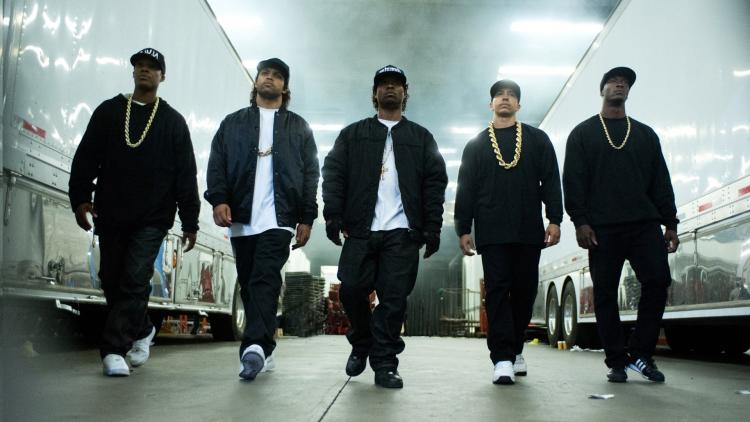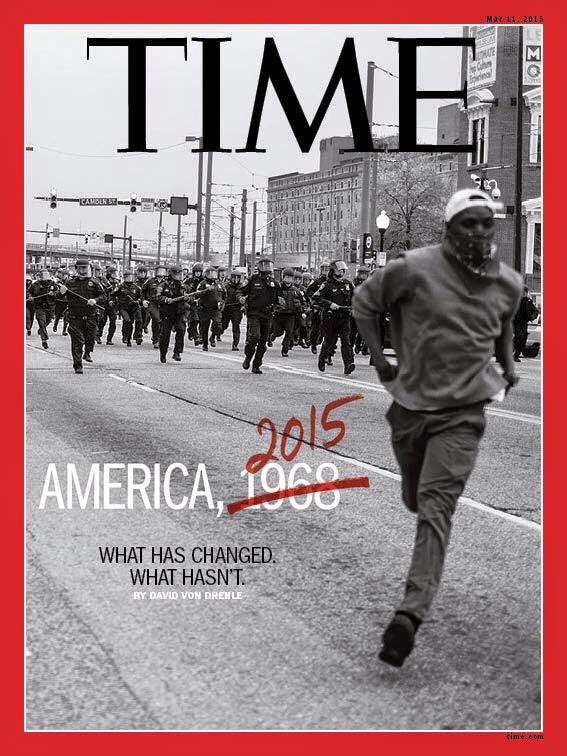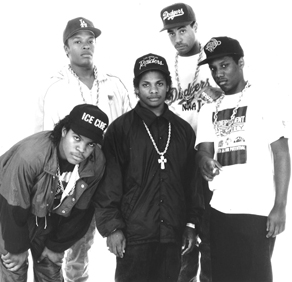"Straight out of the Compton? I don’t get it, who is this exactly?" questioned my professor as I pitched the idea to review the newly released movie about the controversial late 80’s rap group N.W.A.
To be honest, I asked myself the same question. Before viewing the film, I only knew of N.W.A from vague rap references and clips of the group’s most popular hits such as "
Straight Outta Compton" and "
Express Yourself". The movie's director, F. Gary Grey, sought to reacquaint the world with the forgotten history of West Coast “gangsta” rap pioneers N.W.A. The biopic highlights the group’s contribution to rap history, while adding commentary to current social issues such as police brutality, HIV/AIDS in the black community, and the boundaries of freedom of speech.
Early in the film, the group’s cunning yet calculating manager Jerry Haller, played by actor Paul Giamatti, playfully questions if N.W.A stands for “No Whites Allowed.” “No,” responds Easy E, one of the principal members of the rap group. He defensively corrects the mistaken manager, “N---az Wit Attitudes.”
From this moment on, it is clear that the group "N---az Wit Attitudes," or its politically correct epithet, N.W.A, had a goal different than other rap groups that dominated the hip-hop scene at the time. For Easy E, Dr. Dre, and Ice Cube, the main contributors to the group, the goal of their music was to be provocative. Through challenging songs such as “
F--- the Police,” the trio wanted to grab the attention of Americans -- not solely to promote themselves, but to highlight the struggles that plagued people living in their California hometown of Compton, located in South Central Los Angeles.
“Your music promotes violence,” accuses a reporter in a press conference with the rap group. “Our music is a reflection of our environment,” counters Ice Cube. "Reality rap" is the name the group gave their shocking brand of music. In the early 90’s, the working class neighborhood of Compton experienced a rash of police brutality and racial profiling that came to a head during the
1992 Los Angeles race riots. One of the most well-known examples was the
Rodney King beating, in which a young, black, male taxi driver was dragged from his vehicle and brutally beaten by the police. Many attribute this rise in police aggression to the emergence of crack cocaine in the inner cities of America affecting mainly minority populations. In 1986, the Anti-Drug Abuse Act made the punishment for the possession of crack cocaine more extreme than the equally harmful powder cocaine. As a result, there were
approximately 760,000 arrests in 1986 for drug possession, twice as many than prior years. It seemed that the police were looking for suspects and black young men were their main targets.
The song "Fuck the Police" was an outcry against the harsh and often unjust tactics the police used to identify perpetrators since the early days of the Civil Rights movement the 1960’s. The lyrics of the song encourage civilians to use violence to retaliate against the police. The extreme message of the music caught the attention of the FBI and, as showcased in the film, subsequently got the group arrested. The group used freedom of speech as their defense of their artistic statement. This statement is still relevant in the U.S. today, with the riots in Ferguson, Missouri, and the #BlackLivesMatter campaign.
Another issue the movie touches on is the prevalence of HIV/AIDS in the black community. The climax of the movie is when rapper Easy E suddenly gets sick and dies from complications from AIDS. At the time, the disease was highly stigmatized and Easy E was one of the few and the first black males to be open with his status and encourage people to take responsibility of their sex lives.
Today, this remains an extremely relevant topic. In 2012, nearly half of the one million Americans infected with
HIV were black women, men, and children. The movie acts as a catalyst to reopen the dialog surrounding sexual health to create more awareness of the disease.
Although the movie was well received, there were a few common criticisms. The movie addresses a lot of pressing issues, however, it fails to acknowledge the prevalence of misogyny in rap music that still exists in the genre today. N.W.A created the trend of degrading and objectifying women through extremely sexual and graphic lyrics, and even the movie has very few roles depicting independent, intelligent women. The females featured are most typically bitter baby-mamas and scantily clad groupies, whom the rap group treats as sexual props. Charges against Dr. Dre on grounds of domestic violence from his ex-girlfriend, and assault charges filed by female hip-hop journalist Dee Barns were omitted from the film.
For many millennials, and my professor, the members of N.W.A are more known for their more recent commercial successes such as Dr. Dre’s Beats sound systems and Ice Cube’s many B-list movie roles, such as the 21 Jump Street remake, Barbershop, and Are We There Yet. Yet more than 25 years later, Straight Outta Compton reminds viewers of rap group's history and demands that its audience pay attention to social issues that have persisted throughout the decades.
(Photos: Time, Okay Player)










